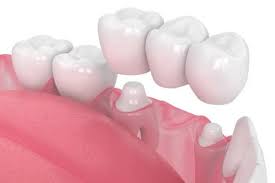Ceramic Crown - Abu Dhabi - Dubai
A ceramic crown, also known as a porcelain crown, is a type of dental crown that is made entirely or primarily from ceramic material. It is used to restore and strengthen damaged or weakened teeth. Here are some key points about ceramic crowns:
- 1. Material: Ceramic crowns are made from a variety of dental-grade ceramics, such as porcelain or zirconia-based materials. These ceramics are known for their strength, durability, and natural appearance.
- 2. Aesthetics: Ceramic crowns are highly aesthetic and can closely mimic the appearance of natural teeth. The ceramic material used in the crown has a translucent quality that allows light to pass through, giving it a similar appearance to tooth enamel. Ceramic crowns can be color-matched to blend seamlessly with the surrounding teeth, providing a natural and lifelike result.
- 3. Biocompatibility: Ceramic materials used in dental crowns are biocompatible, meaning they are safe to use in the mouth and do not cause allergic reactions or sensitivities in most people.
- 4. Tooth Preparation: To place a ceramic crown, the dentist will first prepare the tooth by removing any damaged or decayed portions and shaping it to accommodate the crown. The amount of tooth structure removed is typically minimal, preserving as much healthy tooth structure as possible.
- 5. Precision Fit: Ceramic crowns are custom-made to ensure a precise fit and optimal function. The dentist will take impressions of your teeth, which are then used to create a digital or physical model of your tooth. The crown is fabricated using computer-aided design and manufacturing (CAD/CAM) technology or by a dental laboratory, ensuring an accurate and comfortable fit.
- 6. Durability: Ceramic crowns are known for their durability and resistance to wear and fracture. They can withstand normal biting and chewing forces and provide long-lasting restoration for damaged teeth.
- 7. Care and Maintenance: Ceramic crowns require regular oral hygiene practices, including brushing twice a day and flossing daily. It is also important to visit the dentist regularly for check-ups and professional cleanings. Avoiding habits such as biting or chewing on hard objects can help prolong the life of the crown.
- 8. Stain Resistance: Ceramic crowns have a smooth and non-porous surface, which makes them highly resistant to staining. However, it is still important to maintain good oral hygiene and avoid consuming excessive amounts of staining substances like coffee, tea, or tobacco to keep the crown looking its best.
Ceramic crowns offer a natural-looking and durable restoration option for damaged teeth. However, the suitability of ceramic crowns for your specific dental needs should be determined by a qualified dentist. They will assess your oral condition, discuss treatment options, and provide personalized recommendations based on your unique circumstances.

